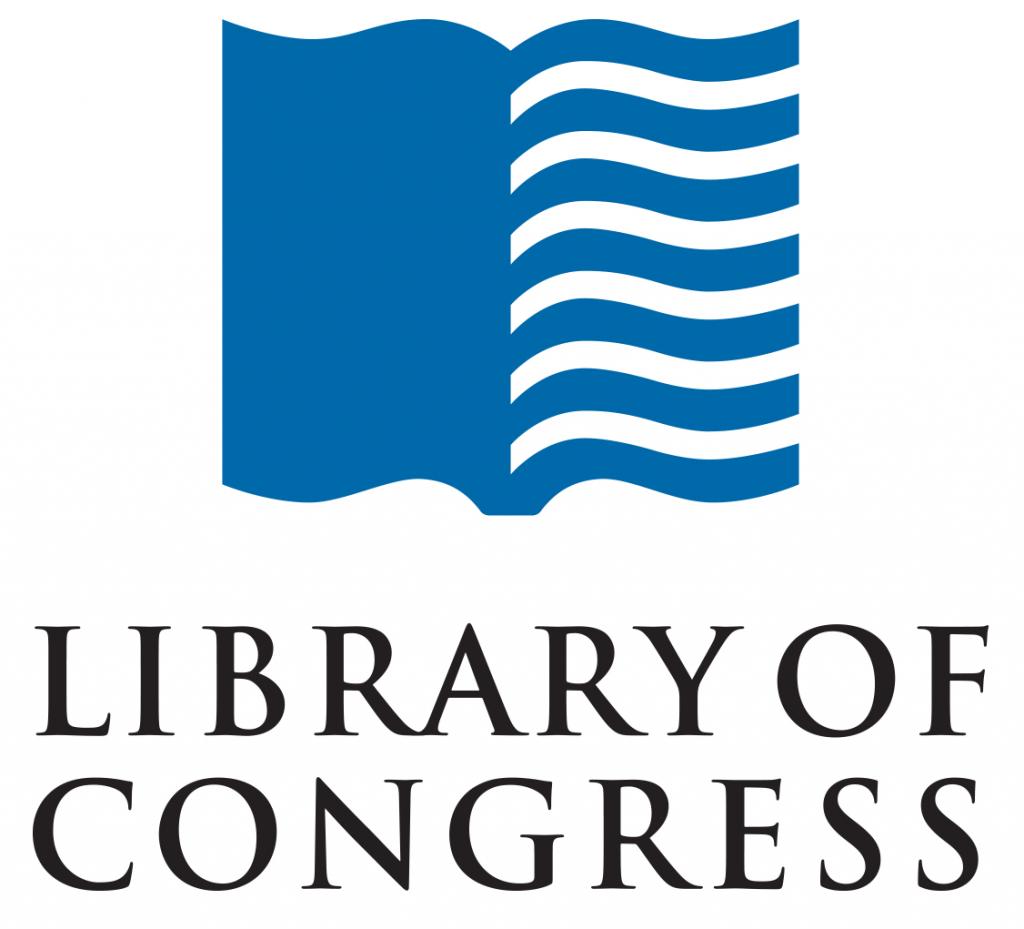from May. 1, 1865
Letter to Mary Todd Lincoln from Queen Victoria
-
Full Title
Letter to Mary Todd Lincoln from Queen Victoria
-
Description
Manuscript transcription of a letter from Queen Victoria to Mrs. Abraham Lincoln, written in purple ink on white woven paper. Queen Victoria, the British monarch, wrote to Mary Lincoln after learning about the assassination of Abraham Lincoln. The two women had never met, but Queen Victoria wanted to convey her sympathies to Mrs. Lincoln because she also lost her husband in 1861 and went into intense mourning.
-
Transcription
Copy of a letter from Queen Victoria to Mrs. President Lincoln Osborne, April. 1865
Thought a stranger to you, cannot remain silent w[?] so terrible a calamity has fallen upon you and your country; and must personally express my deep and heartfelt sympathy wi[?] you under shocking circumstances of your present— dreadful misfortune. No one can better appreciate, than I can, who am myself utterly broken hearted by the loss of my own beloved husband, who was the light of my life, my stay, my all, —what your own sufferings must be, and I earnestly pray that you may be supported by Him, to whom alone the sorely stricken can look for comfort in their hour of heavy afflication.
With the renewed expression of true sympathy, I remain, dear Madam, Your sincere friend, Victoria -
Source
Library of Congress
-
Rights
This item is in the public domain and may be reproduced and used for any purpose, including research, teaching, private study, publication, broadcast or commercial use, with proper citation and attribution.
-
Tags
-
Cite this Item
Queen Victoria. "Letter to Mary Todd Lincoln from Queen Victoria". Remembering Lincoln. Web. Accessed June 30, 2025. https://rememberinglincoln.fords.org/node/1108
-
Creator
Queen Victoria
-
Date
1865
-
Dimensions
21 x 11 cm
from May. 1, 1865
Letter to Mary Todd Lincoln from Queen Victoria
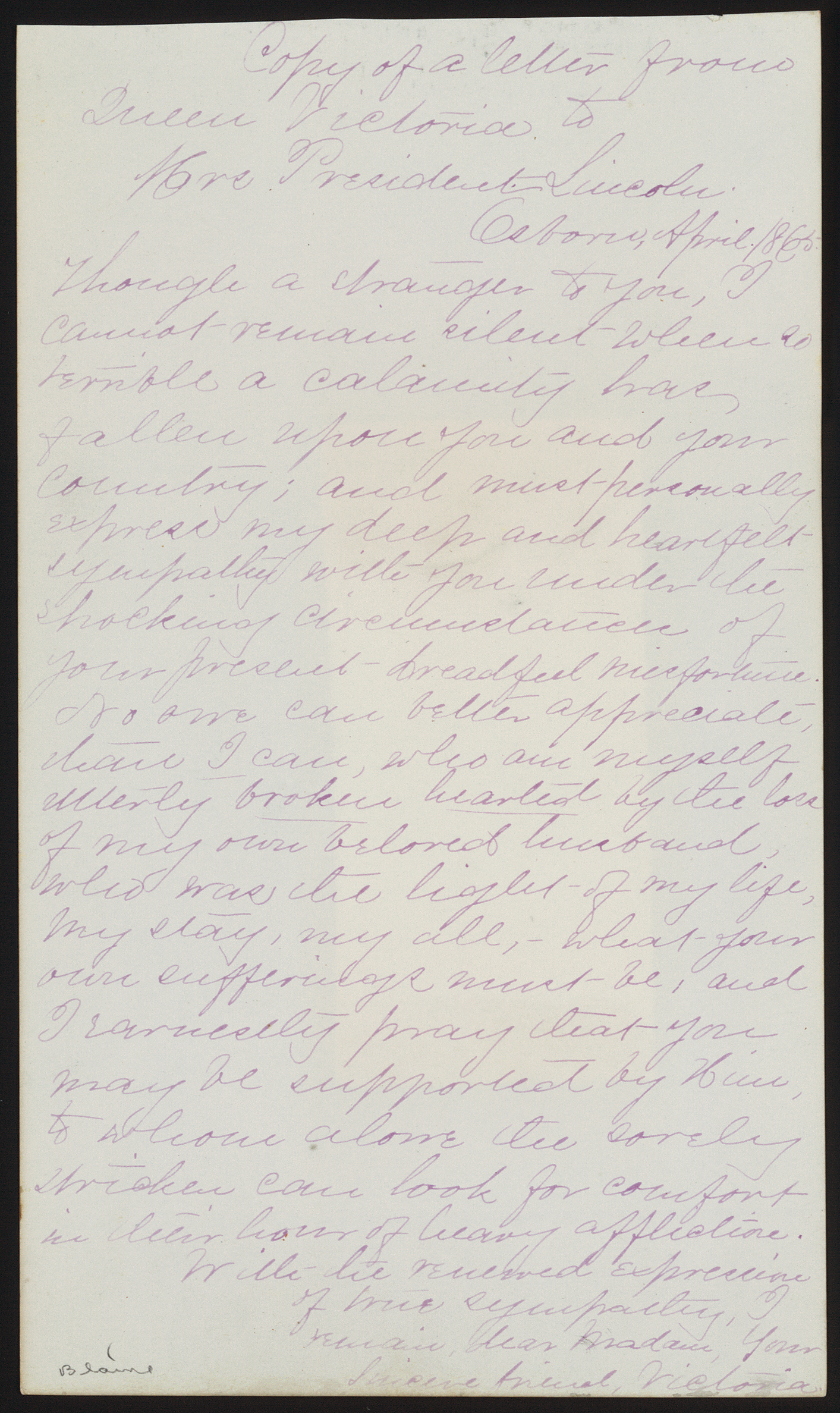
-
Description
Manuscript transcription of a letter from Queen Victoria to Mrs. Abraham Lincoln, written in purple ink on white woven paper. Queen Victoria, the British monarch, wrote to Mary Lincoln after learning about the assassination of Abraham Lincoln. The two women had never met, but Queen Victoria wanted to convey her sympathies to Mrs. Lincoln because she also lost her husband in 1861 and went into intense mourning.
-
Source
Library of Congress
-
Rights
This item is in the public domain and may be reproduced and used for any purpose, including research, teaching, private study, publication, broadcast or commercial use, with proper citation and attribution.
-
Creator
Queen Victoria
-
Date
May 1, 1865
-
Dimensions
21 x 11 cm
from Apr. 14, 1865
Horatio Nelson Taft Diary, April 6-14, 1865
-
Full Title
Horatio Nelson Taft Diary, April 6-14, 1865
-
Description
This excerpt from the diary of Horatio Nelson Taft is an insight into some of the first reactions of citizens of the Union to the death of President Lincoln. Taft, who was a patent clerk, laments Lincoln's teach and denounces the assassination as assassination at it's worst. In the entry just prior to the excerpt describing Lincoln's death, Taft described the return of Lincoln to Washington after a Union victory.
-
Transcription
April 6th 1865
Mr Lincoln has been in Richmond. Near half of the City has been destroyed by fire by the
Rebels themselves as they evacuated it. Large numbers of prisoners have been captured
by Sheridan, Genl Ewell and his Corps, some seven thousand.
April 9, 1865
Genl Lee has surrendered to Genl Grant with his whole Army!! Mr Lincoln has returned to
Washington as in fine Spirits at the prospect of a speedy peace. It is thought that Johnson
and the other rebel Genls will give up now that Lee has surrendered.
April 14th ½ past 10 o'clock P.M.
O, fatal day. O, noble Victim.
Treason has done its worst.
The President has been Assassinated.
It has just been announced at my door
that he was shot a half hour ago at Fords Theatre.
Is it possible?
I have just come from near the scene,
it is too True. 11, o'clock P.M. -
Source
memory.loc.gov
-
Rights
This item is in the public domain and may be reproduced and used for any purpose, including research, teaching, private study, publication, broadcast or commercial use, with proper citation and attribution.
-
Tags
-
Cite this Item
Horatio Nelson Taft. "Horatio Nelson Taft Diary, April 6-14, 1865". Remembering Lincoln. Web. Accessed June 30, 2025. https://rememberinglincoln.fords.org/node/1107
from Apr. 14, 1865
Horatio Nelson Taft Diary, April 6-14, 1865

-
Description
This excerpt from the diary of Horatio Nelson Taft is an insight into some of the first reactions of citizens of the Union to the death of President Lincoln. Taft, who was a patent clerk, laments Lincoln's teach and denounces the assassination as assassination at it's worst. In the entry just prior to the excerpt describing Lincoln's death, Taft described the return of Lincoln to Washington after a Union victory.
-
Source
memory.loc.gov
-
Rights
This item is in the public domain and may be reproduced and used for any purpose, including research, teaching, private study, publication, broadcast or commercial use, with proper citation and attribution.
-
Creator
Horatio Nelson Taft
-
Date
April 14, 1865
-
Material
bound paper with script in ink and type
from Apr. 14, 1865
Diary of Orville Hickman Browning
-
Full Title
Diary of Orville Hickman Browning, Friend of Lincoln - Excerpts from April 14-19, 1865
-
Description
These are the diary entries of former U.S. Senator and friend of President Lincoln, Orville Hickman Browning, the day of Lincoln's assassination up to the funeral in Washington, DC on April 19, 1865. Browning discusses how he heard about the attacks and incorrectly states the Secretary of State Seward was killed. He talks about how Lincoln was the South's best ally within the government and speculates who the attacker was. Over the next few days he visits the White House and describes the body of the fallen president. These excerpts are part of the “Diary of Orville Hickman Browning Volume II: 1865-1881,” published in 1925 by the Illinois State Historical Library. Born in Kentucky in 1806, Browning moved to Quincy, Illinois to become a lawyer. Later he served as a U.S. Senator, adviser to Abraham Lincoln and Andrew Johnson, and even a cabinet minister. Browning and Lincoln became friends while serving in the state legislature; both were members of the Whig party. Browning served as an ally for Lincoln during his presidency.
-
Source
Hathi Trust Digital Library
-
Rights
The written permission of the copyright owners and/or other rights holders (such as publicity and/or privacy rights) is required for distribution, reproduction, or other use of protected items beyond that allowed by fair use or other statutory exemptions.
-
Tags
-
Cite this Item
Orville Hickman Browning. "Diary of Orville Hickman Browning, Friend of Lincoln - Excerpts from April 14-19, 1865". Illinois State Historical Library. Remembering Lincoln. Web. Accessed June 30, 2025. https://rememberinglincoln.fords.org/node/1098
-
Creator
Orville Hickman Browning
-
Publisher
Illinois State Historical Library
-
Date
April 14, 1865
-
Dimensions
22 cm.
from Apr. 14, 1865
Diary of Orville Hickman Browning, Friend of Lincoln - Excerpts from April 14-19, 1865
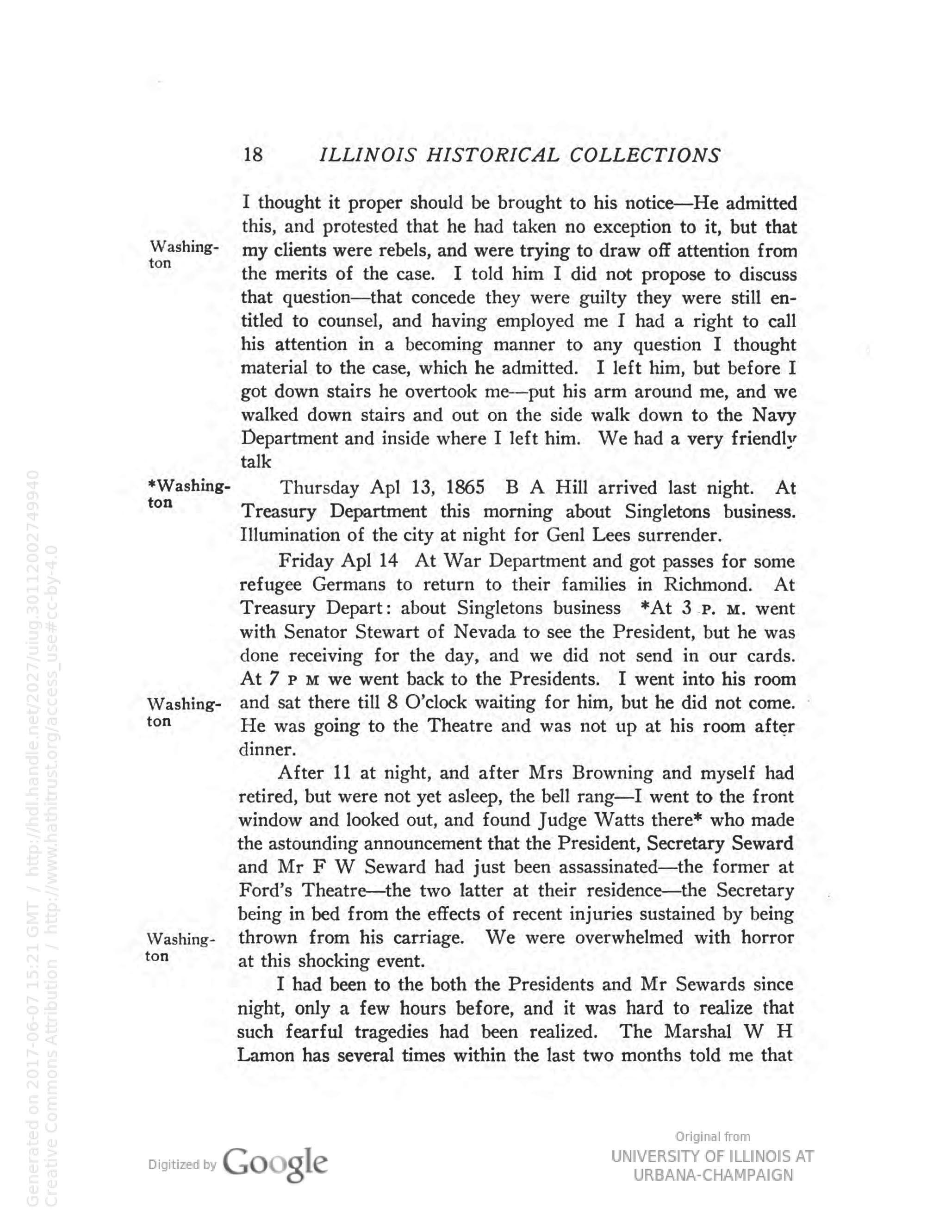
-
Description
These are the diary entries of former U.S. Senator and friend of President Lincoln, Orville Hickman Browning, the day of Lincoln's assassination up to the funeral in Washington, DC on April 19, 1865. Browning discusses how he heard about the attacks and incorrectly states the Secretary of State Seward was killed. He talks about how Lincoln was the South's best ally within the government and speculates who the attacker was. Over the next few days he visits the White House and describes the body of the fallen president. These excerpts are part of the “Diary of Orville Hickman Browning Volume II: 1865-1881,” published in 1925 by the Illinois State Historical Library. Born in Kentucky in 1806, Browning moved to Quincy, Illinois to become a lawyer. Later he served as a U.S. Senator, adviser to Abraham Lincoln and Andrew Johnson, and even a cabinet minister. Browning and Lincoln became friends while serving in the state legislature; both were members of the Whig party. Browning served as an ally for Lincoln during his presidency.
-
Source
Hathi Trust Digital Library
-
Rights
The written permission of the copyright owners and/or other rights holders (such as publicity and/or privacy rights) is required for distribution, reproduction, or other use of protected items beyond that allowed by fair use or other statutory exemptions.
-
Creator
Orville Hickman Browning
-
Publisher
Illinois State Historical Library
-
Date
April 14, 1865
-
Dimensions
22 cm.
from Apr. 20, 1865
Mayor's Proclamation on the Death of Abraham Lincoln - Brownville, Nebraska
-
Full Title
Brownville, Nebraska Territory Mayor's Proclamation on the Death of Abraham Lincoln
-
Description
The newly elected Mayor of Brownville, Nebraska Territory, Charles G. Dorsey, made a proclamation on the death of Abraham Lincoln, which was published in the Nebraska Advertiser the week after the President's death. The town of Brownville heard about Lincoln's death almost immediately. The city of Brownville was only about 10 years old at the time of Lincoln's assassination. The Nebraska Advertiser was founded in 1856 by a recent resident, Robert Wilkinson Furnas. Fumas was opposed to slavery and those views were often illustrated in the newspaper.
-
Source
-
Rights
This item is in the public domain and may be reproduced and used for any purpose, including research, teaching, private study, publication, broadcast or commercial use, with proper citation and attribution.
-
Tags
-
Cite this Item
Nebraska Advertiser. "Brownville, Nebraska Territory Mayor's Proclamation on the Death of Abraham Lincoln". Robert Wilkinson Furnas. Remembering Lincoln. Web. Accessed June 30, 2025. https://rememberinglincoln.fords.org/node/1097
-
Creator
Nebraska Advertiser
-
Publisher
Robert Wilkinson Furnas
-
Date
April 20, 1865
from Apr. 20, 1865
Brownville, Nebraska Territory Mayor's Proclamation on the Death of Abraham Lincoln

-
Description
The newly elected Mayor of Brownville, Nebraska Territory, Charles G. Dorsey, made a proclamation on the death of Abraham Lincoln, which was published in the Nebraska Advertiser the week after the President's death. The town of Brownville heard about Lincoln's death almost immediately. The city of Brownville was only about 10 years old at the time of Lincoln's assassination. The Nebraska Advertiser was founded in 1856 by a recent resident, Robert Wilkinson Furnas. Fumas was opposed to slavery and those views were often illustrated in the newspaper.
-
Source
-
Rights
This item is in the public domain and may be reproduced and used for any purpose, including research, teaching, private study, publication, broadcast or commercial use, with proper citation and attribution.
-
Creator
Nebraska Advertiser
-
Publisher
Robert Wilkinson Furnas
-
Date
April 20, 1865
from Apr. 20, 1865
Letter from William H. Kesler, 3rd Missouri Cavalry
-
Full Title
Letter from William H. Kesler, 3rd Missouri Cavalry, to his sister Rose Ann Kesler
-
Description
A letter from William H. Kesler to his sister Rose Ann Kesler in late April 1865. He writes to her about hearing of the assassination, his sorrow and anger toward the assassin. At the beginning of the Civil War, William H. Kesler resided in Champaign, Illinois but joined the Missouri volunteer units after the quota was reached in his home state. He served in the 3rd Missouri Calvary from January 1862 - June 1865. He joined Company D, which was captained by John H. Reed and composed of men from both Missouri and Illinois. As part of a Union cavalry brigade, the 3rd Missouri Cavalry marched into Arkansas in August 1863, and was part of the force which captured the state capital at Little Rock on September 10th of that year. He spent much of the rest of the war in the Little Rock area and returned home in June of 1865.
-
Transcription
Little Rock Ark April 20th 1865
Dear Sister I seat my self this morn for the purpose of penning you a few lines to let you know that I am in good health and hope those few lines may find you in the same enjoyment. I received yours of the 10th a short time since and was happy to hear from you and learn that you were all in good health. I should like to have been to the Supper given by the good Templers for I know they must have had a fine Supper and a pleasant time. I think you would have been fixed if I had been home the day you had so many visiters but I expect that I would have spoiled the enjoyment of the rest of the party with my (gass). I am glad to hear that you will not open my package of letters that I sent home by Mrs Reed. But tell Mother not to be to sure a bout them being from the girls. And that I will read a few of them to her when I come home. But can not promise to read them all as it would take up to much time and then would not be interesting to her. The joy of the troops here was turned in to sorrow on receiving the news of the assassination of the President. I felt that day a though I could shoot any body that was a rebel. Oh how I should love to have the fun of putting the man to death that Killed the President. My feelings were such that I could have cut him up in inch peaces. But never mind the soldiers of the North will avenge his death with a thousand lives. I want to see this war closed now. For the feelings of the Soldiers now toward the south is not very friendly sure. I Expressed $100.00 One Hundred Dollars home a few days a go by parkers Express. I have nothing of importance to write so I will close hoping to hear from you soon. I remain as ever your Affectionate Brother Will
P.S. please Write soon And excuse mistakes Will
I am going to send you a painting of the hospital at Little Rock. Which I want you to Keep clean and nice untill I come home. Will -
Source
The State Historical Society of Missouri
-
Rights
This item is in the public domain and may be reproduced and used for any purpose, including research, teaching, private study, publication, broadcast or commercial use, with proper citation and attribution.
-
Tags
-
Cite this Item
William H. Kesler. "Letter from William H. Kesler, 3rd Missouri Cavalry, to his sister Rose Ann Kesler". The State Historical Society of Missouri. Remembering Lincoln. Web. Accessed June 30, 2025. https://rememberinglincoln.fords.org/node/1094
-
Creator
William H. Kesler
-
Publisher
The State Historical Society of Missouri
-
Date
April 20, 1865
from Apr. 20, 1865
Letter from William H. Kesler, 3rd Missouri Cavalry, to his sister Rose Ann Kesler
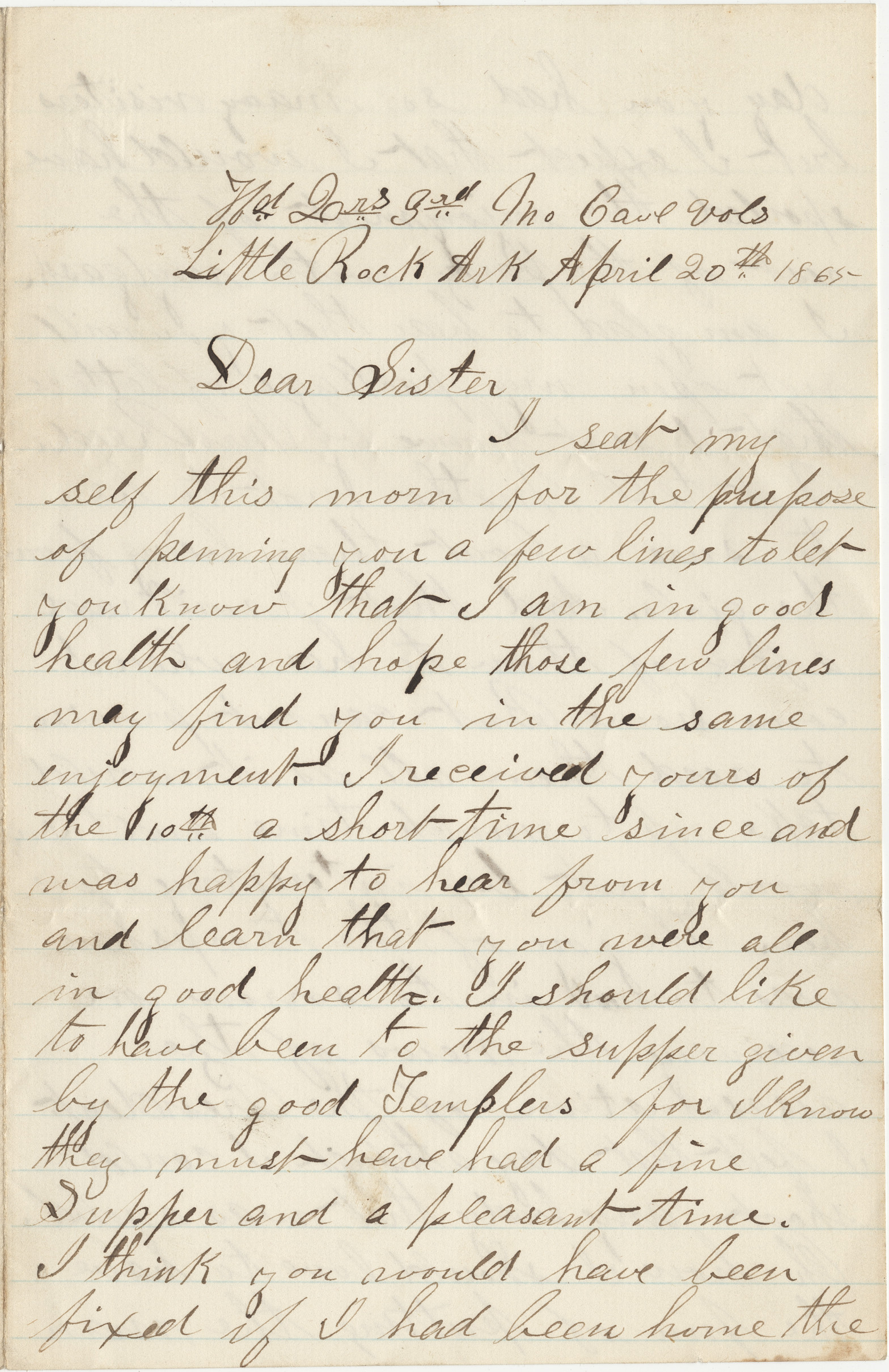
-
Description
A letter from William H. Kesler to his sister Rose Ann Kesler in late April 1865. He writes to her about hearing of the assassination, his sorrow and anger toward the assassin. At the beginning of the Civil War, William H. Kesler resided in Champaign, Illinois but joined the Missouri volunteer units after the quota was reached in his home state. He served in the 3rd Missouri Calvary from January 1862 - June 1865. He joined Company D, which was captained by John H. Reed and composed of men from both Missouri and Illinois. As part of a Union cavalry brigade, the 3rd Missouri Cavalry marched into Arkansas in August 1863, and was part of the force which captured the state capital at Little Rock on September 10th of that year. He spent much of the rest of the war in the Little Rock area and returned home in June of 1865.
-
Source
The State Historical Society of Missouri
-
Rights
This item is in the public domain and may be reproduced and used for any purpose, including research, teaching, private study, publication, broadcast or commercial use, with proper citation and attribution.
-
Creator
William H. Kesler
-
Publisher
The State Historical Society of Missouri
-
Date
April 20, 1865
from Apr. 15, 1865
A Proclamation by Rhode Island Governor
-
Full Title
A Proclamation by James Youngs Smith, Governor of the State of Rhode Island
-
Description
James Youngs Smith, the 29th Governor of Rhode Island, issued a proclamation on the day of Abraham Lincoln's assassination asking the clergy of Rhode Island to commemorate the President and pray for the country during the upcoming Sunday services. Born in Groton, Connecticut in 1809, Smith moved to Providence, Rhode Island at the age of 16 to work for a lumber business. Later in life he bought mills in both Connecticut and Rhode Island. He served three terms as Governor of Rhode Island as a Republican before declining to run for a fourth term. He served throughout the Civil War and was able to fill the state's troop quota through voluntary enlistment because the citizens of Rhode Island opposed drafting soldiers. Smith married Emily Brown, the daughter of a cotton manufacturer from Massachusetts and had three children.
-
Source
Library of Congress, Rare Book And Special Collections Division
-
Rights
Transmission or reproduction of protected items beyond that allowed by fair use requires the written permission of the copyright owners.
-
Tags
-
Cite this Item
James Y. Smith. "A Proclamation by James Youngs Smith, Governor of the State of Rhode Island". Rhode Island, Governor. Remembering Lincoln. Web. Accessed June 30, 2025. https://rememberinglincoln.fords.org/node/1093
-
Creator
James Y. Smith
-
Publisher
Rhode Island, Governor
-
Date
April 15, 1865
-
Material
Printed on page [1] of a single-folded sheet.
-
Dimensions
21 cm.
from Apr. 15, 1865
A Proclamation by James Youngs Smith, Governor of the State of Rhode Island
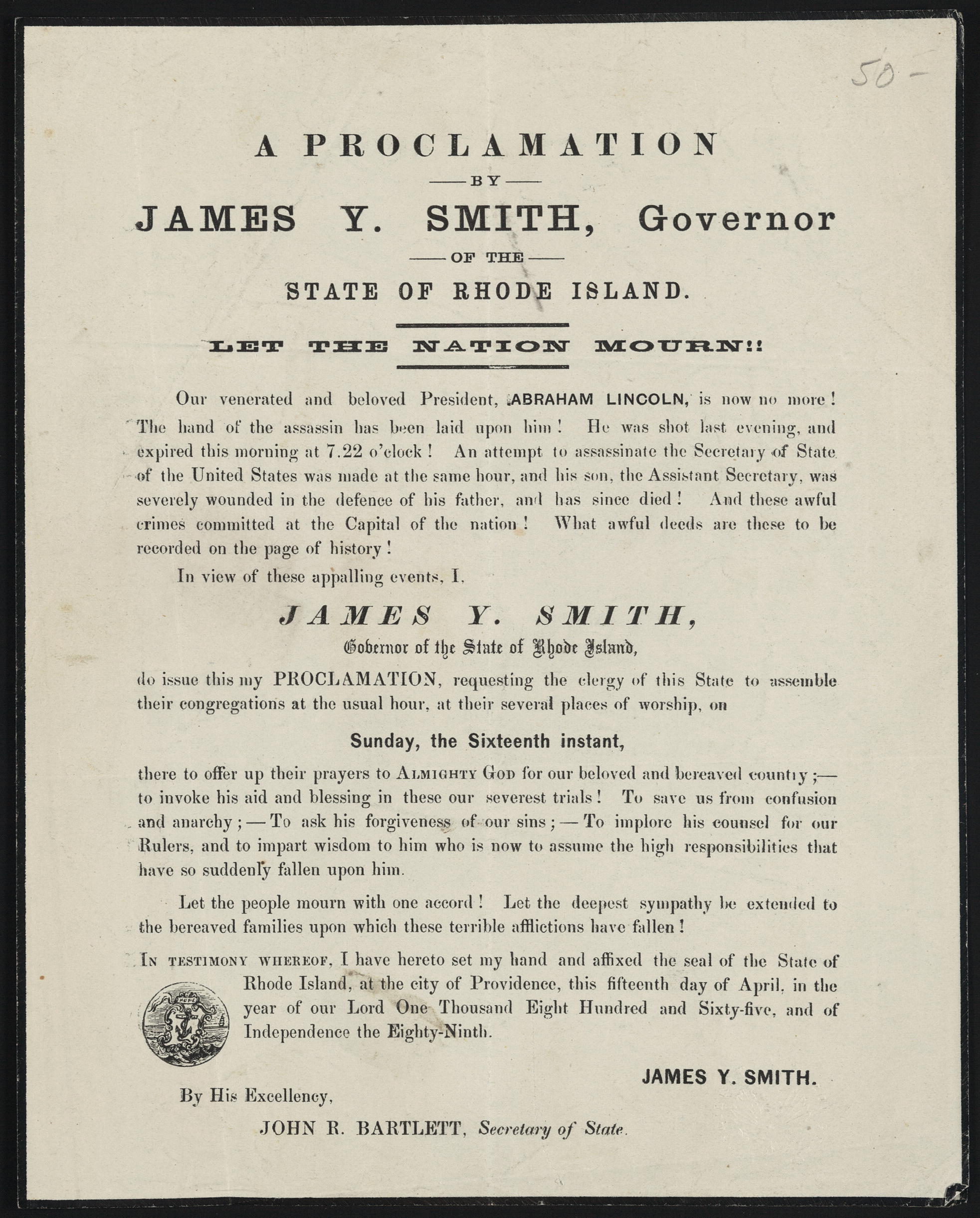
-
Description
James Youngs Smith, the 29th Governor of Rhode Island, issued a proclamation on the day of Abraham Lincoln's assassination asking the clergy of Rhode Island to commemorate the President and pray for the country during the upcoming Sunday services. Born in Groton, Connecticut in 1809, Smith moved to Providence, Rhode Island at the age of 16 to work for a lumber business. Later in life he bought mills in both Connecticut and Rhode Island. He served three terms as Governor of Rhode Island as a Republican before declining to run for a fourth term. He served throughout the Civil War and was able to fill the state's troop quota through voluntary enlistment because the citizens of Rhode Island opposed drafting soldiers. Smith married Emily Brown, the daughter of a cotton manufacturer from Massachusetts and had three children.
-
Source
Library of Congress, Rare Book And Special Collections Division
-
Rights
Transmission or reproduction of protected items beyond that allowed by fair use requires the written permission of the copyright owners.
-
Creator
James Y. Smith
-
Publisher
Rhode Island, Governor
-
Date
April 15, 1865
-
Material
Printed on page [1] of a single-folded sheet.
-
Dimensions
21 cm.
from Jan. 1, 1929
"Long, Long Ago" by Clara Clough Lenroot
-
Full Title
"Long, Long Ago" - Memoir of Clara Clough Lenroot, Childhood in Wisconsin
-
Description
Born in 1857, Clara Clough Lenroot was less than 10 years old when President Lincoln was assassinated. This excerpt, from her memoir "Long, Long Ago" published in 1929, highlights her family's reaction to the news as they were moving to their new home in the wilderness outside of Osceola Mills, Wisconsin. Her father, Solon H. Clough, was a lawyer from Fulton, New York who hoped to find fortune out West in the early 1860s. Later in life, Clara married Irvine Lenroot who served in the U.S. House of Representatives from 1909 to 1918 and in the U.S. Senate from 1918 to 1927. Throughout the 1930s their daughter Katharine fought to regulate child labor laws and successfully lobbied for the Fair Labor Standards Act of 1938, which also established a national minimum wage. Katharine also served as third Chief of the United States Children's Bureau.
-
Transcription
In April of that year we moved over to our own farm, about a mile away, and about two miles away from the village of Osceola. I recall one interesting incident of the day on which we took possession of the farm. It was April, 1865. We were driving to our new home. Arriving at a little brook, father drove the horse into the stream to water him. As we waited a man came along on horseback, drew rein on the bridge, and beckoned to father. He drove through the stream, got out of the buggy and approached the man, who spoke a few words to him in a low, earnest voice. Father uttered an exclamation of dismay, and came back and told Mother the astounding news that Lincoln had been assassinated! So was that tremendous news transmitted to us, undoubtedly two or three days after its occurrence, as we had no telegraphic communication. The dreadful news permeated slowly by some such means as it came to us to the remotest parts of the country.
We rode on in silence. We little girls sensed the fact that calamity had overtaken our world. We were hushed by the sorrow in our parents’ faces, and asked no questions. In sad silence we approached the farmhouse that was to be our home, an event which we had anticipated with tremendous excitement and curiosity. Arrived at the little home, father and mother made some pretence of arranging the household goods, but mother soon seated herself upon a bench outside the kitchen door, and tears ran down her face. Father came and sat beside her, wiping his own eyes, and took her hand in his. We children stood around, more and more impressed by their grief. Little was done towards settling the new home that day.
(In sharp contrast to the slow progress of the news of Lincoln’s assassination came the news of President Harding’s death in 1923 to a rural camp in the midst of the pine forest. There a radio set had been installed. Mrs. Claude Luse, alone in her camp near Gordon, Wisconsin, children and maid in bed, was listening to a fine concert being radioed from the Drake Hotel in Chicago. A singer had just begun a solo. She had sung but a few words when the music stopped and a voice said, “We have just had word that President Harding died in San Francisco ten minutes ago; stand by for confirmation.” In a few seconds the statement was confirmed. Mrs. Luse’s neighbor, Mr. Gallaher, starting to town early the next morning, carried the news with him along the route.)
[Transcription by: Kyra S., Dr. Susan Corbesero’s Class, Ellis School, Pittsburgh, Pennsylvania] -
Source
Library of Congress, General Collections and Rare Book and Special Collections Division
-
Rights
The written permission of the copyright owners and/or other rights holders (such as publicity and/or privacy rights) is required for distribution, reproduction, or other use of protected items beyond that allowed by fair use or other statutory exemptions.
-
Tags
-
Cite this Item
Clara Clough Lenroot. ""Long, Long Ago" - Memoir of Clara Clough Lenroot, Childhood in Wisconsin". Badger Printing Company. Remembering Lincoln. Web. Accessed June 30, 2025. https://rememberinglincoln.fords.org/node/1092
-
Creator
Clara Clough Lenroot
-
Publisher
Badger Printing Company
-
Date
1929
-
Dimensions
24 cm.
from Jan. 1, 1929
"Long, Long Ago" - Memoir of Clara Clough Lenroot, Childhood in Wisconsin
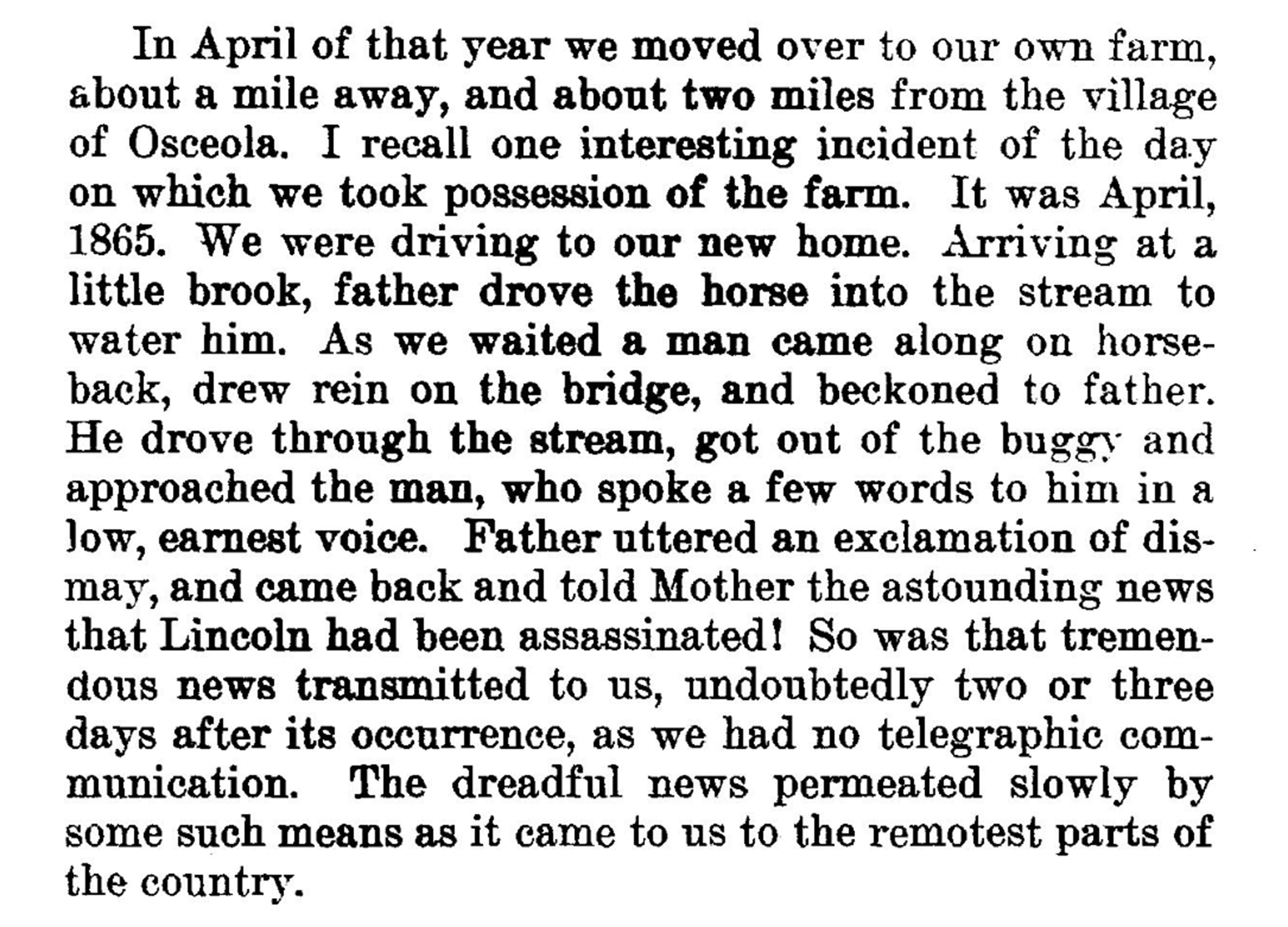
-
Description
Born in 1857, Clara Clough Lenroot was less than 10 years old when President Lincoln was assassinated. This excerpt, from her memoir "Long, Long Ago" published in 1929, highlights her family's reaction to the news as they were moving to their new home in the wilderness outside of Osceola Mills, Wisconsin. Her father, Solon H. Clough, was a lawyer from Fulton, New York who hoped to find fortune out West in the early 1860s. Later in life, Clara married Irvine Lenroot who served in the U.S. House of Representatives from 1909 to 1918 and in the U.S. Senate from 1918 to 1927. Throughout the 1930s their daughter Katharine fought to regulate child labor laws and successfully lobbied for the Fair Labor Standards Act of 1938, which also established a national minimum wage. Katharine also served as third Chief of the United States Children's Bureau.
-
Source
Library of Congress, General Collections and Rare Book and Special Collections Division
-
Rights
The written permission of the copyright owners and/or other rights holders (such as publicity and/or privacy rights) is required for distribution, reproduction, or other use of protected items beyond that allowed by fair use or other statutory exemptions.
-
Creator
Clara Clough Lenroot
-
Publisher
Badger Printing Company
-
Date
January 1, 1929
-
Dimensions
24 cm.
from May. 1, 1865
Lincoln's requiem
-
Full Title
Lincoln's requiem
-
Description
Lincoln's requiem was composed for chorus (mixed voices, 4 parts) and piano. Associated with the Union side, the song mourns President Lincoln's death and praises his legacy as an advocate for freedom and liberty. The lyrics consist of five verses and a refrain. Part of the Library of Congress Civil War Sheet Music Collection.
-
Transcription
Verse:
Dead! dead! how swift the dire news flies,
And wakes a nation's agonies!
From town to town, from mouth to mouth
Swift spreads the dreaded message forth;
In lowly cot, in lordly hall,
This grief enshrouds and covers all.
And on the breast drops ev'ry head,
In sorrow for the noble dead.
Chorus:
Oh, weep for fallen greatness! weep!
Let tears express our woes;
But while our Lincoln's soul doth sleep,
Brave men strike down his foes!
Verse:
Dead! dead! but not as warriors die,
He fell not shouting battle cry--
Not in the open light of heavn'--
Not in his home his soul was risen--
Not on the plain where hand to hand
The brave cross blade with foemen's brand,
But where the waves of pleasure flow,
Death aim'd his shaft thro' secret foe. [Chorus]
Verse:
Dead! dead! and now when hopes were high,
And wars dread curse was passing by,
When traitors had their madness stay'd,
And hero hands sheathed vegeful blade,
When homes and hearthstones gleamd afar,
To manly hearts grown tired of war,
And long wooed peace had left the sky,
It was no time for him to die. [Chorus]
Verse:
Dead! dead! and when the millions free
Sent up their shouts of liberty,
When from the depths of bondage wrung,
Sweet freedoms song, by freedmen sung,
When million hearts their thanks out pour'd
And angel ears in pleasure heard,
When words his hand has trac'd live on
It is not meet to mourn him gone. [Chorus]
Verse:
Dead! dead! and has he died in vain?
Shall we in lethargy remain?
His years of patriot toil forget
Shall unavenged his life sun set?
No! for this blow in treach'ry given,
The smoke of strife shall rise to heav'n,
And 'till our flag in triumph waves
His foes and ours find bloody graves! [Chorus]
-
Source
-
Rights
Public Domain. Suggested credit: Civil War Sheet Music Collection, Library of Congress, Music Division.
-
Tags
-
Cite this Item
Butterfield, J. A. (composer); Boynton, Irene (lyricist). "Lincoln's requiem". Chicago: H. M. Higgins, 1865. Remembering Lincoln. Web. Accessed June 30, 2025. https://rememberinglincoln.fords.org/node/1021
from May. 1, 1865
Lincoln's requiem

-
Description
Lincoln's requiem was composed for chorus (mixed voices, 4 parts) and piano. Associated with the Union side, the song mourns President Lincoln's death and praises his legacy as an advocate for freedom and liberty. The lyrics consist of five verses and a refrain. Part of the Library of Congress Civil War Sheet Music Collection.
-
Source
-
Rights
Public Domain. Suggested credit: Civil War Sheet Music Collection, Library of Congress, Music Division.
-
Creator
Butterfield, J. A. (composer); Boynton, Irene (lyricist)
-
Publisher
Chicago: H. M. Higgins, 1865
-
Date
May 1, 1865
from Apr. 22, 1865
P.W. Oakley to Norman Henry Ives
-
Full Title
P.W. Oakley to Norman Henry Ives
-
Description
P.W. Oakley of St. Louis, Missouri, wrote this letter to Norman Henry Ives in Nashville, Tennessee, on April 22, 1865, a week after John Wilkes Booth assassinated President Abraham Lincoln. Oakley and Ives shared the bond of having been injured during the Civil War--Ives, a native of Illinois, had been discharged from the U.S. Army after suffering a leg wound at the Battle of Pea Ridge in 1862. Oakley begins the letter by discussing his injury. He then turns to his thoughts about the assassination of Lincoln, referring to the slain president as "Uncle Abe." Oakley suggests that Lincoln would have shown more lenience to Confederates than his successor, Andrew Johnson, would (speculation that would prove untrue). He also expresses hope that Confederate leadership would "pull hemp"--be hanged--for the assassination. Oakley then goes on to brag about the size of his 10-month-old son. Ives kept this letter and eventually passed it down through his family. His great-great-granddaughter Arlis Groves, a social science teacher at Toby Johnson Middle School in Elk Grove, California, now holds this letter and contributed it to Remembering Lincoln.
-
Transcription
April 22, 1865
St. Louis Mo
Friend Ives
Dear Sir,
I just got your note of Apr. 10th. I was glad to receive a line from my brother soldier. It has been a long time since I had a line from you. I am glad that you have got around once more. I can get around very well, but my limb discharges yet. It is very sore. I am haveing a peace of bone coming out, & I hope when it gets out that it will close up. We aught to be thankful to god that we came out as well as we did, many a poor man has lost his life since this war began. What a loss we have met with. (Aughful to think of, when we think of Uncle Abe. & to think that it was a Reb. that took his life. The Rebs. have lost a good friend in the death of our Chief Magistrate, for he has gave the Rebs more lenity than Andy Johnson will. I say when they struck at the heart of Mr. Lincoln they struck at the heart of all loyal men in America, & I hope to god that Andy Johnson will make the head men of the south pull hemp. You are aware how I once felt in regard to this war. But, I say today, kill the last traitor to his country. By the way, Ives, I have got the bigist son of his age in the west. 10 months old and his weight is 40 lbs. Have you seen a biger one than that? If so, let me know it. My wife is well. And so is my son. Ives, some day you will get your money that I owe you. I shant forget your kindness nor nether shall I forget that I ow you. I would like to see you & if you should come to St Louis, come and see me. Say what you are at in your next.
Yours &c,
P.W. Oakley -
Source
Arlis Groves, great-great-granddaughter of Norman Henry Ives
-
Rights
This item is in the public domain and may be reproduced and used for any purpose, including research, teaching , private study, publication, broadcast or commercial use, with proper citation and attribution.
-
Tags
-
Cite this Item
P.W. Oakley. "P.W. Oakley to Norman Henry Ives". Remembering Lincoln. Web. Accessed June 30, 2025. https://rememberinglincoln.fords.org/node/1016
-
Creator
P.W. Oakley
-
Date
April 22, 1865
from Apr. 22, 1865
P.W. Oakley to Norman Henry Ives
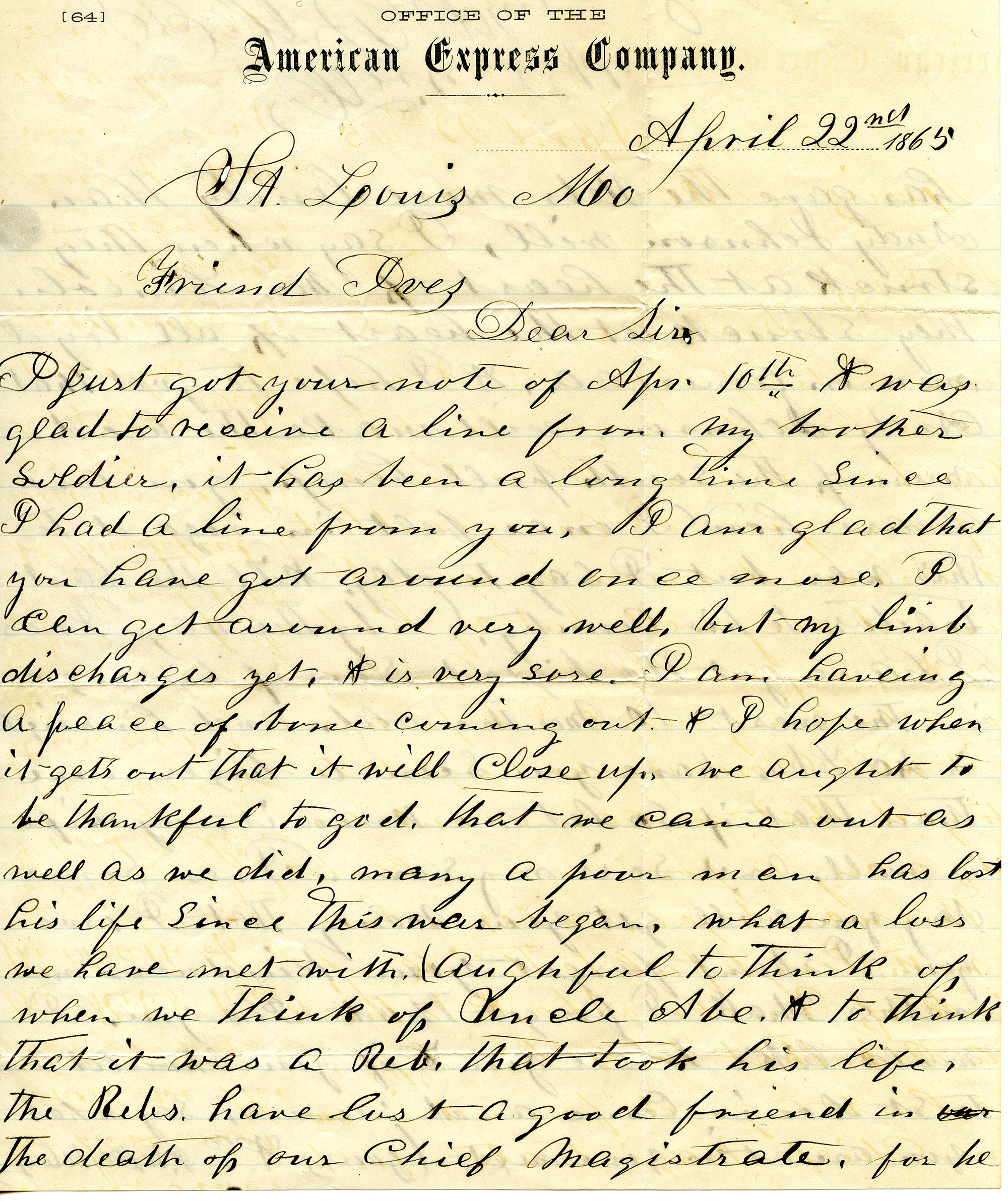
-
Description
P.W. Oakley of St. Louis, Missouri, wrote this letter to Norman Henry Ives in Nashville, Tennessee, on April 22, 1865, a week after John Wilkes Booth assassinated President Abraham Lincoln. Oakley and Ives shared the bond of having been injured during the Civil War--Ives, a native of Illinois, had been discharged from the U.S. Army after suffering a leg wound at the Battle of Pea Ridge in 1862. Oakley begins the letter by discussing his injury. He then turns to his thoughts about the assassination of Lincoln, referring to the slain president as "Uncle Abe." Oakley suggests that Lincoln would have shown more lenience to Confederates than his successor, Andrew Johnson, would (speculation that would prove untrue). He also expresses hope that Confederate leadership would "pull hemp"--be hanged--for the assassination. Oakley then goes on to brag about the size of his 10-month-old son. Ives kept this letter and eventually passed it down through his family. His great-great-granddaughter Arlis Groves, a social science teacher at Toby Johnson Middle School in Elk Grove, California, now holds this letter and contributed it to Remembering Lincoln.
-
Source
Arlis Groves, great-great-granddaughter of Norman Henry Ives
-
Rights
This item is in the public domain and may be reproduced and used for any purpose, including research, teaching , private study, publication, broadcast or commercial use, with proper citation and attribution.
-
Creator
P.W. Oakley
-
Date
April 22, 1865
from Apr. 15, 1865
Proceedings of The Union League
-
Full Title
Proceedings of the Union League of Philadelphia regarding the Assassination of Abraham Lincoln, President of the United States.
-
Description
This pamphlet includes the meetings and proceedings of The Union League of Philadelphia after the assassination of President Lincoln. The Board of Directors met on April 15 "immediately after information had been received of the murder of the President..." and a special meeting was held on April 17 for all members. Several members spoke about the impact of the President's death, the evils of slavery and its role in his death, God's Providence, and the best ways to honor and mourn Lincoln. During this meeting on April 17, the League commissioned mourning badges for League members and their families to wear for the month following Lincoln's death.
-
Transcription
A full scan of this pamphlet is available through the Internet Archive, www.archive.org.
-
Source
The Abraham Lincoln Foundation of The Union League of Philadelphia (Object ID: XI.2.007 and XI.2.008)
-
Rights
Use of this item for research, teaching and private study is permitted with proper citation and attribution, as “Courtesy of The Abraham Lincoln Foundation of The Union League of Philadelphia.” Reproduction of this item for publication, broadcast or commercial use requires written permission. For permission, please contact The Abraham Lincoln Foundation.
-
Tags
-
Cite this Item
The Union League of Philadelphia. "Proceedings of the Union League of Philadelphia regarding the Assassination of Abraham Lincoln, President of the United States.". Henry B. Ashmead. Remembering Lincoln. Web. Accessed June 30, 2025. https://rememberinglincoln.fords.org/node/1014
from Apr. 15, 1865
Proceedings of the Union League of Philadelphia regarding the Assassination of Abraham Lincoln, President of the United States.
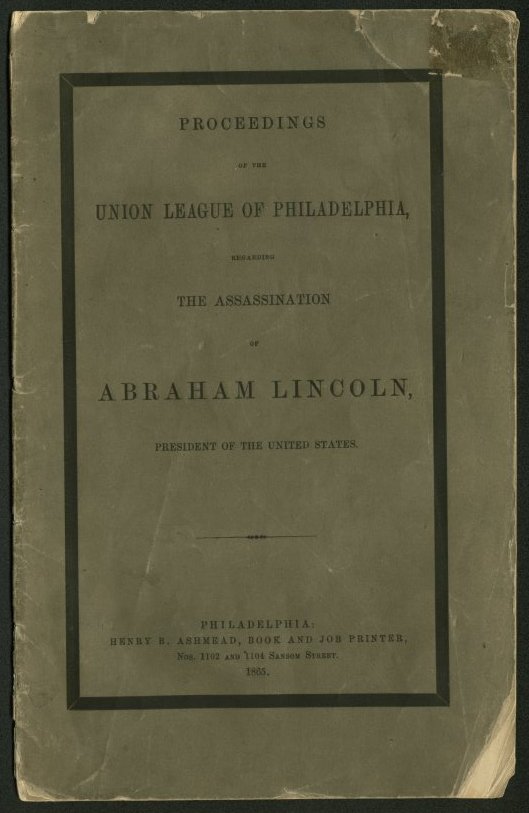
-
Description
This pamphlet includes the meetings and proceedings of The Union League of Philadelphia after the assassination of President Lincoln. The Board of Directors met on April 15 "immediately after information had been received of the murder of the President..." and a special meeting was held on April 17 for all members. Several members spoke about the impact of the President's death, the evils of slavery and its role in his death, God's Providence, and the best ways to honor and mourn Lincoln. During this meeting on April 17, the League commissioned mourning badges for League members and their families to wear for the month following Lincoln's death.
-
Source
The Abraham Lincoln Foundation of The Union League of Philadelphia (Object ID: XI.2.007 and XI.2.008)
-
Rights
Use of this item for research, teaching and private study is permitted with proper citation and attribution, as “Courtesy of The Abraham Lincoln Foundation of The Union League of Philadelphia.” Reproduction of this item for publication, broadcast or commercial use requires written permission. For permission, please contact The Abraham Lincoln Foundation.
-
Creator
The Union League of Philadelphia
-
Publisher
Henry B. Ashmead
-
Date
April 15, 1865
-
Material
Ink and Paper

